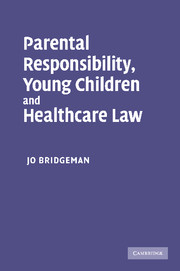Book contents
- Frontmatter
- Contents
- Acknowledgements
- Table of cases
- Table of legislation and international instruments
- 1 Parents, young children and healthcare law
- 2 Child-centred healthcare services for children
- 3 Child health and parental obligations
- 4 In the best interests of the child?
- 5 The quality of life of severely disabled children
- 6 Obligations and caring responsibilities
- 7 Relational responsibilities
- Bibliography
- Index
3 - Child health and parental obligations
Published online by Cambridge University Press: 17 July 2009
- Frontmatter
- Contents
- Acknowledgements
- Table of cases
- Table of legislation and international instruments
- 1 Parents, young children and healthcare law
- 2 Child-centred healthcare services for children
- 3 Child health and parental obligations
- 4 In the best interests of the child?
- 5 The quality of life of severely disabled children
- 6 Obligations and caring responsibilities
- 7 Relational responsibilities
- Bibliography
- Index
Summary
What is a parent and what does being a parent involve?
This chapter provides an analysis of the legal obligations imposed upon parents for the management of the health of their children. There is an examination of the boundaries established by the criminal law, the obligations imposed by civil law and the responsibilities enacted in the Children Act 1989. The aim of this chapter is to examine the obligations upon parents for the everyday care of their children's health, usually left to parents to fulfil within the privacy of the home according to their preferences, values and priorities. Parents will usually resolve any disagreements about their children's healthcare, between themselves, in private. The chapter ends with two examples which were brought into the public sphere of the courtroom as a consequence of disagreement between the mother and father, both of whom had parental responsibility.
The first issue to consider in an account of the current law is an examination of the legal status of parent and the concept of parental responsibility. In common use, reference to ‘parent’ may encompass parentage (the genetic link), parenthood (ongoing responsibility for a child) or parenting (the activity of being a parent). Although each has a different focus – upon biology, accountability or practice respectively – all are relational, that is, they depend upon the existence of a child.
- Type
- Chapter
- Information
- Parental Responsibility, Young Children and Healthcare Law , pp. 81 - 122Publisher: Cambridge University PressPrint publication year: 2007



